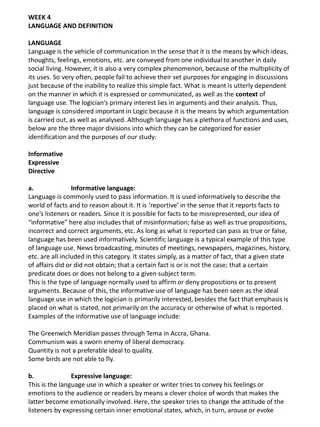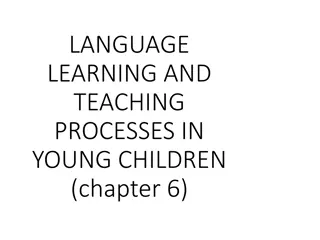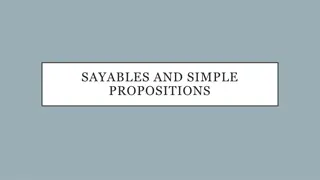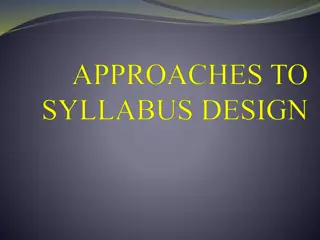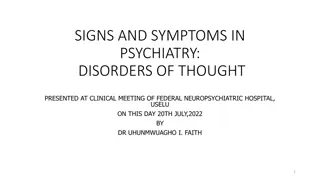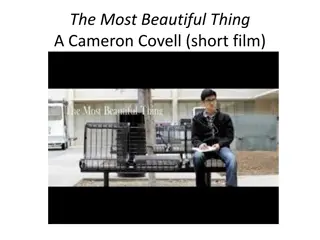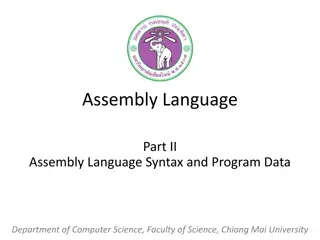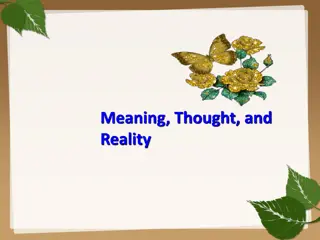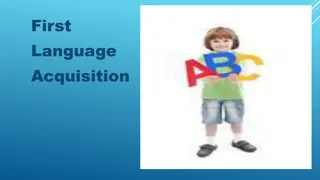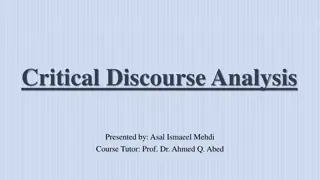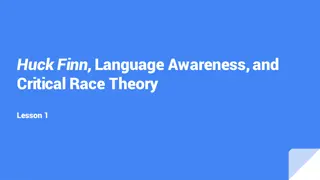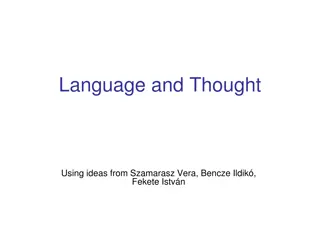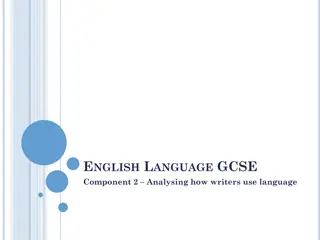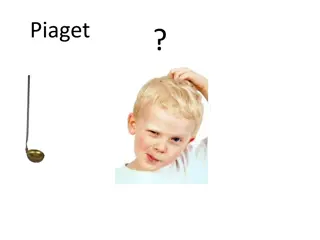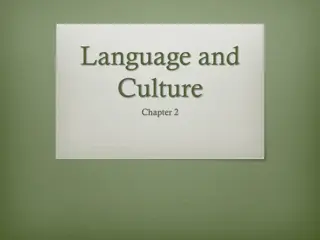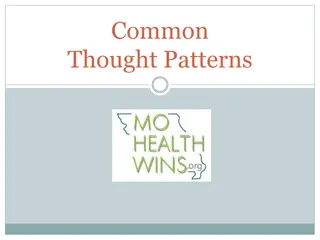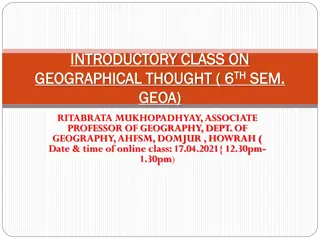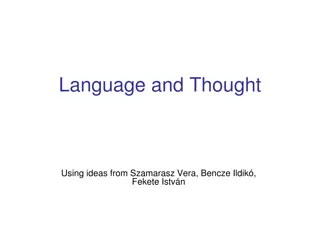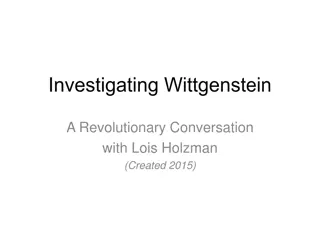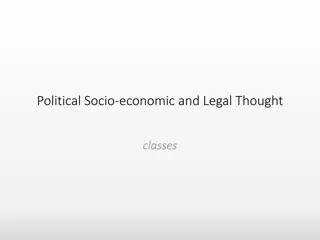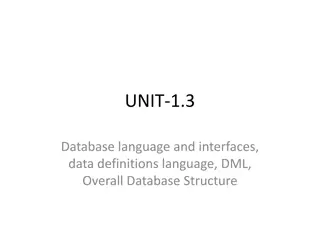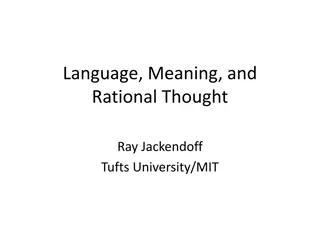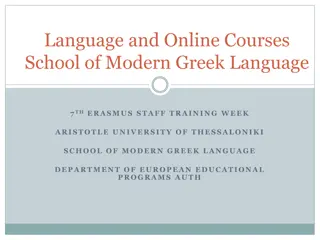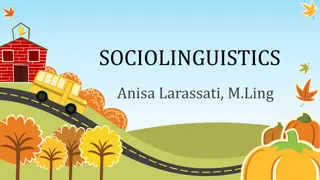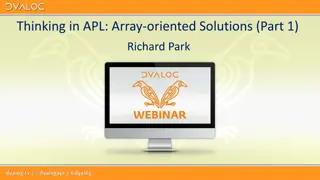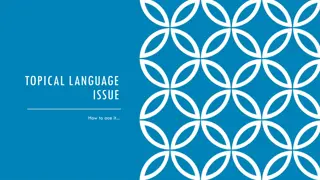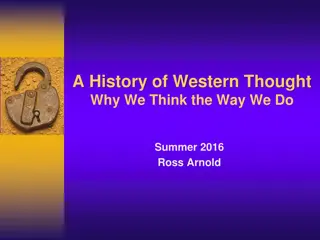Language Study Community – Enhance Your Language Skills
Joining a Language Study Group is a fantastic way to take your language learning to the next level. By leveraging the power of Group Study, you can immerse yourself in the language, enhance your understanding, and build confidence in your speaking abilities. Read full article \/\/explainlearning.com
1 views • 3 slides
Academic Language Demands and Supports in Instructional Planning
Academic Language Demands and Supports are crucial in educational settings to ensure comprehension and usage of language by students. This content discusses embedding language demands in lesson plans, providing language supports, and peer review activities to enhance academic language skills. The fo
6 views • 10 slides
The Significance of Media in Language Learning
Media plays a crucial role in language learning by raising awareness of the ideology behind linguistic structures and providing valuable information on society and culture. Linguists are drawn to media language for research purposes and to understand its impact on language use and attitudes. Media s
12 views • 5 slides
Understanding Translation: Key Concepts and Definitions
Translation involves transferring written text from one language to another, while interpreting deals with oral communication. Etymologically, the term "translation" comes from Latin meaning "to carry over." It is a process of replacing an original text with another in a different language. Translat
11 views • 76 slides
Language and Communication in Society: Understanding Interactions
Explore the intricate relationship between language and society through lectures focusing on language in interaction, power dynamics, language contact and change, public space discourse, linguistic landscaping, and more. Delve into the shift from structural linguistics to societal communication, red
6 views • 28 slides
Understanding Language: Informative, Expressive, and Directive Uses
Language serves as a vital medium for communication, allowing the conveyance of ideas, thoughts, and emotions. It is a complex phenomenon with diverse uses. This text delves into the three major divisions of language use - informative, expressive, and directive. Informative language conveys facts, w
4 views • 6 slides
Language Learning and Teaching Processes in Young Children
Development of language in young children is influenced by various factors such as their cultural and linguistic environment, unique characteristics, and interactions with adults. Optimal language development requires language stimulation from the environment. Varied cultural practices impact langua
1 views • 51 slides
Understanding Language in Stoicism: Significance and Corporeality
Language in Stoicism plays a crucial role in the process of assenting to impressions by focusing on corporeality, reason, and truth. It distinguishes between the mundane vocal sounds, articulated speech, and significant language to convey meanings effectively. The significance of language lies not i
2 views • 13 slides
Understanding Language Teaching Syllabus: Integration, Theory, and Approaches
Language Teaching Syllabus involves the integration of subject matter and linguistic elements, guided by theories of language and learning. Various approaches like Grammatical, Situational, Communicative, and Analytic are used to structure syllabi. Breaking language into parts aids in sequential lea
1 views • 28 slides
Understanding Thought Disorders in Psychiatry: Insights from Clinical Meeting Presentation
Explore the definitions and divisions of thought disturbances in psychiatry, including disorders of thought stream, form, content, and possession. Delve into thought stream disorders like tempo and continuity disruptions, as well as form of thinking disorders seen in conditions like schizophrenia. G
1 views • 32 slides
Exploring Language and Communication Through a Short Film
In this lesson, students will watch a 10-minute short film titled "The Most Beautiful Thing" by Cameron Covell. They will reflect on the value of learning another language, analyze how facial expressions and body language convey emotions, and develop empathy towards those facing language barriers or
0 views • 29 slides
Introduction to Assembly Language Syntax and Program Data
Learn about the syntax of assembly language and how data, variables, and constants are used in programming. Explore the basic instructions and the translation of high-level language into assembly language. Discover the role of an assembler in translating assembly language programs into machine langu
4 views • 36 slides
Enhancing Language Learning Across the Curriculum in B.Ed. 1st Year Course
Language Across the Curriculum (LAC) emphasizes that language learning should occur across all subjects, not just in language classrooms. It highlights the importance of incorporating language development into every learning activity, fostering multilingualism in schools. Language plays a crucial ro
2 views • 34 slides
Exploring Meaning, Thought, and Reality in Linguistics
Delve into the fascinating realm of semantics and linguistic theories, where the interplay between language, thought, and reality is deciphered. Concepts like reference, denotation, and the relationship between linguistic expressions and the world are explored through the works of renowned linguists
0 views • 37 slides
Understanding First Language Acquisition Process
First language acquisition is the process through which humans develop the capacity to perceive, comprehend, and effectively use language to communicate. It primarily focuses on infants acquiring their native language. Basic requirements, caregiver speech features, and the acquisition schedule play
0 views • 19 slides
Introduction to Critical Discourse Analysis (CDA)
Critical Discourse Analysis (CDA) is the study of language use in social contexts, integrating social theories with discourse analysis methods. Originating in the 1970s as Critical Linguistics (CL), CDA evolved to focus on how language reflects and shapes social meaning. The relationship between CL
0 views • 32 slides
Exploring Language, Dialects, and Critical Race Theory in Literature
Delve into the complexities of language diversity, dialects, and critical race theory through literary works such as "Huck Finn" and "Brown Girl Dreaming". The discussions cover topics like the right way to speak, perceptions of dialects in literature, the power dynamics of language, and societal at
0 views • 22 slides
Speech and Language Developmental Milestones: A Bilingual/Multilingual Perspective
Speech and language developmental milestones are crucial for children, regardless of their home language. These milestones encompass receptive language, expressive language, pragmatics, and articulation and phonology. Understanding how a child hears and talks from birth to one year is essential, as
1 views • 23 slides
Language and Thought: Exploring the Relationship
Explore the intricate relationship between language and thought, delving into whether one shapes the other, the impact of language on perception, and the influence of political correctness. Discover early experiments, word-finding difficulties, and various perspectives on the cognitive development-l
0 views • 46 slides
Analyzing Writer's Language Use in English Language GCSE Component 2
In English Language GCSE Component 2, students learn to analyze how writers use language. The learning objective focuses on commenting, explaining, and analyzing language use with relevant subject terminology. The exam assesses students on their ability to interpret and explain a writer's thoughts,
0 views • 12 slides
Thought Development Through Creative Tool Innovation
Explore the journey of thought development through the innovative creation of tools like the "Soupstaser" and "Deflagarating Spoon", showcasing the process of schema assimilation and accommodation. Silver, shiny, long cups that are hard to bend, swingable, and durable play a crucial role in this tho
3 views • 9 slides
Language and Culture Reflections: Diversity in Linguistic Emphasis
Exploring the correlation between language and culture, this content delves into how various languages reflect cultural values and priorities. Through examples like the Inuit language with rich vocabulary for snow and seals, the Shinzwani culture's unique word for mother and aunt, and the evolving l
0 views • 50 slides
Understanding Common Thought Patterns in Communication
Common thought patterns in communication help structure messages effectively to increase understanding and engagement. Recognizing these patterns benefits readers by enhancing comprehension, engagement, recall, and writing skills. The five most common thought patterns are list, sequence, definition,
0 views • 16 slides
Introduction to Geographical Thought: Key Concepts and Major Schools
Geographical thought explores the description and interpretation of Earth's phenomena, addressing fundamental questions of geography. It involves concepts such as Earth surface, spatial distribution, areal differentiation, and more. It also delves into the relations with other sciences and social sc
0 views • 21 slides
The Intriguing Relationship Between Language and Thought
Explore the fascinating connection between language and thought, delving into questions like whether one shapes the other, the impact of political correctness on our thinking, early experiments on language and cognition, word-finding difficulties, and differing perceptions of the world across langua
0 views • 44 slides
Introduction to Language Technologies at Jožef Stefan International Postgraduate School
This module on Knowledge Technologies at Jožef Stefan International Postgraduate School explores various aspects of Language Technologies, including Computational Linguistics, Natural Language Processing, and Human Language Technologies. The course covers computer processing of natural language, ap
0 views • 27 slides
Exploring Wittgenstein's Revolutionary Ideas on Language and Philosophy
Ludwig Wittgenstein, a brilliant 20th-century philosopher, challenged fundamental concepts in psychology, education, and medicine. His unique perspective on language, logic, and thought encourages us to question assumptions and play with language. Wittgenstein's quotes inspire us to rethink understa
0 views • 13 slides
Exploring Sociolinguistics: Language Variation and Social Factors
Sociolinguistics delves into the study of language variation influenced by social factors, examining the relationship between language and its social context. It explores various aspects like standard pronunciation, language choice, speech acts, language components, language variety, and factors suc
0 views • 73 slides
Evolution of Criminal Law and Thought: From Pre-Classical Era to Enlightenment
Explore the progression of criminal law and thought from the Pre-Classical School of Thought to the Enlightenment era. Delve into concepts like folkways, mores, and the origins of criminal law, including examples such as societal norms, dress codes, and supernatural explanations for behaviors during
0 views • 23 slides
Understanding Assembly Language Programming for Computing Layers
Assembly language is a low-level programming language that enables direct interaction with a computer's hardware components. This content explores the fundamentals of assembly language, the relationship between human-readable machine language and binary code, an assembly language program for multipl
0 views • 31 slides
Comprehensive Guide to Political, Socio-Economic, and Legal Thought Classes
This comprehensive guide covers topics for essays and presentations in Political, Socio-Economic, and Legal Thought classes. It includes deadlines, presentation subjects, essay requirements, and examples like Plato's ideologies on State, Economy, Law, Bio, Morality, and Society. Students must adhere
0 views • 11 slides
Database Language and Interfaces Overview
A database management system (DBMS) requires appropriate languages and interfaces to handle queries and updates for data manipulation and control. This includes Data Definition Language (DDL), Data Manipulation Language (DML), Data Control Language (DCL), and Transaction Control Language (TCL). Each
0 views • 12 slides
Exploring Language, Meaning, and Rational Thought in Cognitive Science
Dive into the intriguing realm of thought processes and inner speech as discussed by prominent scholars such as Plato, John B. Watson, Peter Carruthers, Noam Chomsky, and Ludwig Wittgenstein. Discover varying perspectives on how language intertwines with our conscious thoughts, challenging conventio
0 views • 111 slides
Understanding Language Anxiety in Foreign Language Learning and Teaching
Explore the impact of language anxiety on students and teachers in foreign language learning and teaching contexts through insights from Dr. Christina Gkonou's research. Delve into the theoretical background, implications for language education, and real-life experiences shared at the Essex Language
0 views • 25 slides
School of Modern Greek Language: Courses, Seminars, and Assessment Overview
Explore the School of Modern Greek Language at Aristotle University of Thessaloniki offering language courses, seminars for teachers, and assessment exams. Founded in 1970, the school provides a multicultural environment for students worldwide, emphasizing Greek culture and offering a variety of lan
0 views • 17 slides
Understanding Sociolinguistics: Language and Society Interactions
Sociolinguistics is the study of the relationship between language and society, analyzing how language reflects and shapes social structures. It explores the uses of language within different communities, addressing power dynamics and societal norms. Sociolinguists examine language patterns, attitud
0 views • 63 slides
Exploring Array-Oriented Solutions in APL by Richard Park
Array Programming Language (APL) offers a powerful approach to problem-solving through array-oriented solutions. Richard Park delves into the intricacies of APL, highlighting its tools of thought, language primitives, and problem-solving techniques. The webinar covers the significance of notation as
0 views • 40 slides
Navigating Linguistic Controversies in Modern Discourse
In this guide, you will learn the rules and techniques to excel in topical language writing. From addressing controversial language topics to engaging an intelligent audience, the article delves into the nuances of structuring your writing, using appropriate language registers, and maintaining a cur
0 views • 12 slides
Evolution of Western Philosophical Thought: From Idealism to Humanism
Explore the rich history of Western philosophical thought from the idealism of Plato to the humanism of Whitehead. Trace the progression of thought, including materialism, rationalism, skepticism, and relativism, as key thinkers like Descartes, Kant, Marx, and others shaped our understanding of real
0 views • 16 slides
Exploring Language, Decision-Making, and Consumer Psychology
Delve into the intricate relationship between language and decision-making, discover how advertising utilizes language to influence consumer behavior, and examine the impact of semantics and the framing effect on our perceptions. Understand the elements of language, such as phonemes, morphemes, and
0 views • 76 slides





